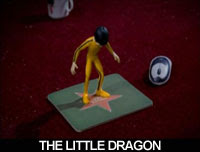Sundance ’20: Yalda, A Night for Forgiveness
*/****
starring Sadaf Asgari, Behnaz Jafari, Babak Karimi, Fereshteh Sadr Orafaee
written and directed by Massoud Bakhshi
by Walter Chaw About 20 minutes into Massoud Bakhshi’s shrill Yalda, A Night for Forgiveness (hereafter Yalda), I put my hands over my ears to blunt the constant keening. It’s also the point where I started wondering what this film was on about. There’s something brilliant and fascinating at the core of Yalda–a movie about an Iranian variety/game show in which the fate of someone sentenced to death hangs on the forgiveness of one of the people they’ve wronged–that makes its hamfistedness a real pity. Gathered are what we might call the plaintiff and the defendant to sit in an “Ellen”-style talk-show nook to tell their stories and air their grievances and then let the audience deliver a verdict via text message, whether or not a blood-money bounty will be paid to the aggrieved should they decide to exercise some grace. That’s horrible. It’s not more horrible than the U.S. justice system, which offers no such opportunity of recourse for the accused (heaven forbid a Christian nation ever exercise forgiveness and actually value life), but it’s horrible just the same.

